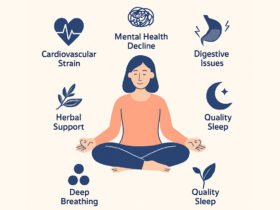Stress is a natural part of life, but when it becomes chronic, it can have negative effects on your physical and mental health. While there are many strategies for managing stress, one of the most effective is meditation. In this blog post, we’ll explore how meditation can help reduce stress and manage the daily challenges of life.
Understanding Stress
Stress is a natural response to challenging or threatening situations. When you encounter a stressor, your body releases hormones such as cortisol and adrenaline that prepare you to fight or flee. This response is useful in short bursts, but when stress becomes chronic, it can have negative effects on your health.
Chronic stress has been linked to a range of health problems, including cardiovascular disease, diabetes, and mental health disorders such as anxiety and depression. That’s why it’s important to find effective ways to manage stress and promote relaxation.
How Meditation Reduces Stress
Meditation is a practice that involves training your mind to focus and be present in the moment. By doing so, you can reduce the impact of stress on your body and mind. Here are some of the ways that meditation can help reduce stress:
-
Reducing Cortisol Levels
Cortisol is a hormone that is released in response to stress. When cortisol levels remain high for extended periods of time, it can have negative effects on your body and mind. Meditation has been shown to reduce cortisol levels and promote relaxation.
One study found that participants who practiced meditation for eight weeks had lower cortisol levels compared to those who didn’t meditate. Another study found that regular meditation practice led to a reduction in cortisol levels and improved immune function.
-
Promoting Relaxation
Meditation is a relaxation technique that can help calm your mind and body. By focusing on your breath, a sound, or a visualization, you can promote relaxation and reduce the impact of stress on your body and mind.
One study found that participants who practiced meditation for just 10 minutes a day for eight weeks reported reduced stress and improved overall wellbeing.
-
Improving Sleep
Stress can interfere with sleep, and lack of sleep can increase stress levels. Meditation has been shown to improve sleep quality, which can reduce stress and improve overall wellbeing.
One study found that participants who practiced meditation for eight weeks had improved sleep quality compared to those who didn’t meditate. Another study found that regular meditation practice led to improved sleep quality and reduced symptoms of insomnia.
-
Enhancing Resilience
Resilience is the ability to cope with challenges and bounce back from adversity. Meditation has been shown to enhance resilience and promote a positive outlook on life.
One study found that participants who practiced meditation for eight weeks had improved resilience and reduced symptoms of anxiety and depression. Another study found that regular meditation practice led to improved emotional regulation and reduced symptoms of stress and anxiety.
How to Get Started with Meditation
If you’re new to meditation, it can be helpful to start with a guided meditation. There are many apps and online resources that offer guided meditations for beginners.
To get started with meditation, find a quiet space where you won’t be interrupted. Sit in a comfortable position with your back straight and your feet on the ground. Close your eyes and focus on your breath. Breathe in through your nose and out through your mouth, counting to four on each inhale and exhale.
If your mind starts to wander, gently bring your focus back to your breath. You can also try focusing on a sound or visualization if that helps you relax.
Try to meditate for at least 10 minutes a day, and gradually increase the length of your sessions as you become more comfortable with the practice.
Conclusion
In conclusion, meditation is a powerful tool for reducing stress and promoting relaxation. By reducing cortisol levels, promoting relaxation, improving sleep quality, and enhancing resilience, meditation can have a positive impact on your overall well-being. Whether you’re new to meditation or have been practicing for years, incorporating this technique into your daily routine can help you manage daily challenges and improve your quality of life. By taking the time to focus on your breath and be present in the moment, you can reduce the impact of stress on your body and mind and cultivate a greater sense of calm and peace.










Leave a Reply